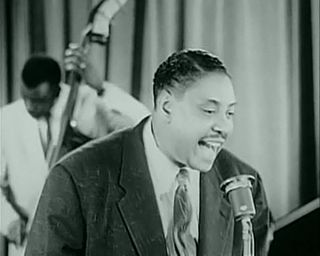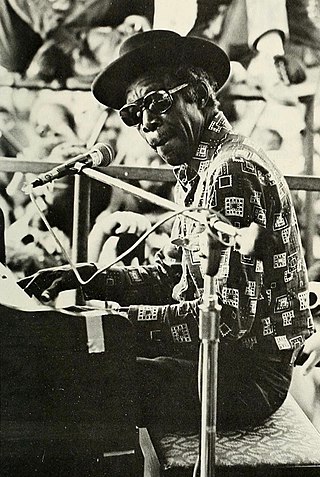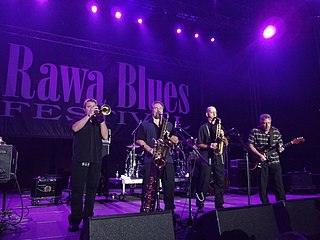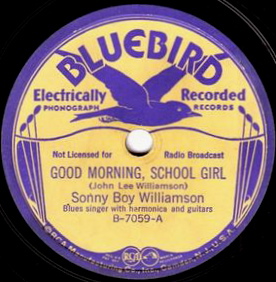
Blues is a music genre and musical form that originated amongst African-Americans in the Deep South of the United States around the 1860s. Blues has incorporated spirituals, work songs, field hollers, shouts, chants, and rhymed simple narrative ballads from the African-American culture. The blues form is ubiquitous in jazz, rhythm and blues, and rock and roll, and is characterized by the call-and-response pattern, the blues scale, and specific chord progressions, of which the twelve-bar blues is the most common. Blue notes, usually thirds, fifths or sevenths flattened in pitch, are also an essential part of the sound. Blues shuffles or walking bass reinforce the trance-like rhythm and form a repetitive effect known as the groove.

Rhythm and blues, frequently abbreviated as R&B or R'n'B, is a genre of popular music that originated within African-American, Black-American, community in the 1940s. The term was originally used by record companies to describe recordings marketed predominantly to African Americans, at a time when "rocking, jazz based music ... [with a] heavy, insistent beat" was becoming more popular. In the commercial rhythm and blues music typical of the 1950s through the 1970s, the bands usually consisted of a piano, one or two guitars, bass, drums, one or more saxophones, and sometimes background vocalists. R&B lyrical themes often encapsulate the African-American history and experience of pain and the quest for freedom and joy, as well as triumphs and failures in terms of societal racism, oppression, relationships, economics, and aspirations.

Henry Roeland "Roy" Byrd, better known as Professor Longhair or "Fess" for short, was an American singer and pianist who performed New Orleans blues. He was active in two distinct periods, first in the heyday of early rhythm and blues and later in the resurgence of interest in traditional jazz after the founding of the New Orleans Jazz and Heritage Festival in 1970. His piano style has been described as "instantly recognizable, combining rumba, mambo, and calypso".
Jump blues is an up-tempo style of blues, jazz, and boogie woogie usually played by small groups and featuring horn instruments. It was popular in the 1940s and was a precursor of rhythm and blues and rock and roll. Appreciation of jump blues was renewed in the 1990s as part of the swing revival.
Electric blues is blues music distinguished by the use of electric amplification for musical instruments. The guitar was the first instrument to be popularly amplified and used by early pioneers T-Bone Walker in the late 1930s and John Lee Hooker and Muddy Waters in the 1940s. Their styles developed into West Coast blues, Detroit blues, and post-World War II Chicago blues, which differed from earlier, predominantly acoustic-style blues. By the early 1950s, Little Walter was a featured soloist on blues harmonica using a small hand-held microphone fed into a guitar amplifier. Although it took a little longer, the electric bass guitar gradually replaced the stand-up bass by the early 1960s. Electric organs and especially keyboards later became widely used in electric blues.

Marion Walter Jacobs, known as Little Walter, was an American blues musician, singer, and songwriter, whose revolutionary approach to the harmonica had a strong impact on succeeding generations, earning him comparisons to such seminal artists as Django Reinhardt, Charlie Parker and Jimi Hendrix. His virtuosity and musical innovations fundamentally altered many listeners' expectations of what was possible on blues harmonica. He was inducted into The Rock and Roll Hall of Fame in 2008, the first and, to date, only artist to be inducted specifically as a harmonica player.
Blues rock is a fusion genre and form of rock music that relies on the chords/scales and instrumental improvisation of blues. It is mostly an electric ensemble-style music with instrumentation similar to electric blues and rock. From its beginnings in the early to mid-1960s, blues rock has gone through several stylistic shifts and along the way it inspired and influenced hard rock, Southern rock, and early heavy metal.

James Edward "Snooky" Pryor was an American Chicago blues harmonica player. He claimed to have pioneered the now-common method of playing amplified harmonica by cupping a small microphone in his hands along with the harmonica, although on his earliest records, in the late 1940s, he did not use this method. In 2023, he was inducted in the Blues Hall of Fame.

John Lee Curtis "Sonny Boy" Williamson was an American blues harmonica player, singer and songwriter. He is often regarded as the pioneer of the blues harp as a solo instrument. He played on hundreds of recordings by many pre–World War II blues artists. Under his own name, he was one of the most recorded blues musicians of the 1930s and 1940s and is closely associated with Chicago producer Lester Melrose and Bluebird Records. His popular songs, original or adapted, include "Good Morning, School Girl", "Sugar Mama", "Early in the Morning", and "Stop Breaking Down".

"Train Kept A-Rollin'" is a song first recorded by American jazz and rhythm and blues musician Tiny Bradshaw in 1951. Originally performed in the style of a jump blues, Bradshaw borrowed lyrics from an earlier song and set them to an upbeat shuffle arrangement that inspired other musicians to perform and record it. Johnny Burnette and the Rock and Roll Trio made an important contribution in 1956 – they reworked it as a guitar riff-driven song, which features an early use of intentionally distorted guitar in rock music.
Mr. B., is an American boogie-woogie pianist.

Roomful of Blues is an American jump blues and swing revival big band based in Rhode Island. With a recording career that spans over 50 years, they have toured worldwide and recorded many albums. Roomful of Blues, according to the Chicago Sun-Times, "Swagger, sway and swing with energy and precision". Since 1967, the group’s blend of swing, rock and roll, jump blues, boogie-woogie and soul has earned it five Grammy Award nominations and many other accolades, including seven Blues Music Awards. Billboard called the band "a tour de force of horn-fried blues…Roomful is so tight and so right." The Down Beat International Critics Poll has twice selected Roomful of Blues as Best Blues Band.

Luther Tucker was an American blues guitarist.

"Good Morning, School Girl" is a blues standard that has been identified as an influential part of the blues canon. Pre-war Chicago blues vocalist and harmonica pioneer John Lee "Sonny Boy" Williamson first recorded it in 1937. Subsequently, a variety of artists have recorded versions of the song, usually calling it "Good Morning Little Schoolgirl".
Charley Booker was an American blues singer and guitarist from the Mississippi Delta, who recorded in the early 1950s for Modern Records.
"Baby Face" Leroy Foster was an American blues singer, drummer and guitarist, active in Chicago from the mid-1940s until the late 1950s. He was a significant figure in the development of the postwar electric Chicago blues sound, particularly as a member of the Muddy Waters band during its early years.

Lester Hill, known professionally as Joe Hill Louis, was an American singer, guitarist, harmonica player and one-man band. He was one of a small number of one-man blues bands to have recorded commercially in the 1950s. He was also a session musician for Sun Records.

Lazy Bill Lucas was an American blues musician who was part of the birth of the Chicago blues scene in the 1940s, 1950s and early 1960s. He then took his talents to Minneapolis, Minnesota, becoming an important part of that city's blues history until his death.
Arnold Burke "Doc" Wiley was an American ragtime, blues and rhythm and blues musician, actor and political activist from the 1910s to the 1960s. Although Wiley may not have scored any notable hits during his long career, he was notable both for the sheer length of that career, which stretched from the ragtime era to the early years of rock and roll, and for his ability to constantly adapt his style to these changing tastes.
Deborah Chessler was a songwriter whose song "It's Too Soon to Know" was number one on the American rhythm and blues charts in November 1948 and is considered by some to be the first rock and roll song. Chessler had songwriting credits on recordings every decade since then.












